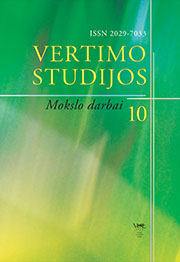KULTŪRINIAI KONCEPTAI KALBOJE: EPISTEMINĖS FRAZĖS „I THINK“ IR SU JA SUSIJUSIŲ MODELIŲ YPATUMAI IR JŲ VERTIMAS Į LIETUVIŲ KALBĄ
THE CULTURAL UNDERPINNINGS OF ENGLISH: AN ANALYSIS OF THE EPISTEMIC PHRASE “I THINK” AND RELATED MODELS AND THEIR TRANSLATION INTO LITHUANIAN
Author(s): Jonė Grigaliūnienė, Aušra TumosaitėSubject(s): Theoretical Linguistics, Philology, Translation Studies
Published by: Vilniaus Universiteto Leidykla
Keywords: English language; Translation; Phrase I think;
Summary/Abstract: The present paper deals with the analysis of the English epistemic phrase “I think” and its related models and their translation into Lithuanian. The aim of the paper is to find out whether the phrase “I think” and its related models can be treated as a cultural concept, peculiar to just the English language, having a unique Anglo script which does not have an exact equivalent in other languages. The analysis is based on the methodological framework of the Natural Semantic Metalanguage and the concept of cultural scripts worked out by Anna Wierzbicka. The data comes from two parallel corpora: the Parallel Opus Corpus, which stores texts of European Parliament meetings, and the Parallel English-Lithuanian Corpus compiled at the Centre of Computational Linguistics of Vytautas Magnus University (PELC), which consists mainly of fiction and some non-fiction texts. The analysis identified the most frequent translation variants in the spoken and written language. It has been discovered that in the spoken language (Opus Corpus), the most frequent translation variant of the epistemic phrase “I think” is the first-person present-tense mental perception verb manau (53,5 per cent). Manau cultural script corresponds to the Anglo “I think” script. Meanwhile, in the written language (PELC), manau constitutes 26,5 per cent of all “I think” translation variants. In the remaining cases the translation of the epistemic phrase “I think” varied highly. The findings show that the related epistemic phrases “I believe”, “I suspect”, “I suppose” and “I guess” in most cases are also rendered by means of the first-person present-tense mental perception verb manau. The research showed that epistemic phrases are cultural concepts that have no direct equivalents in the Lithuanian language and that the cultures and mindsets in question are different. It has been established that cultural acknowledgement of the limitations of one’s knowledge is a vast topic of Anglo culture and the English language and it should be approached carefully and systematically.
Journal: Vertimo studijos
- Issue Year: 10/2017
- Issue No: 10
- Page Range: 135-155
- Page Count: 21
- Language: Lithuanian

